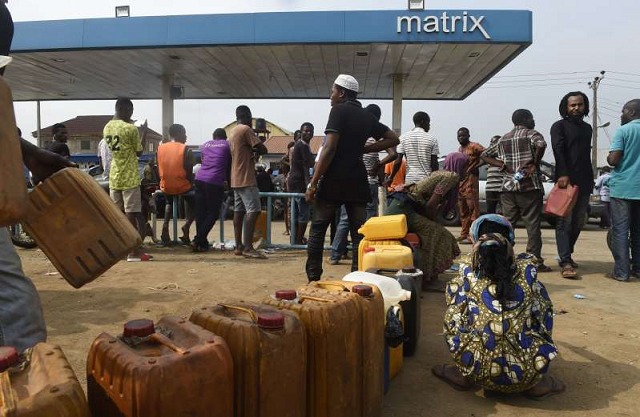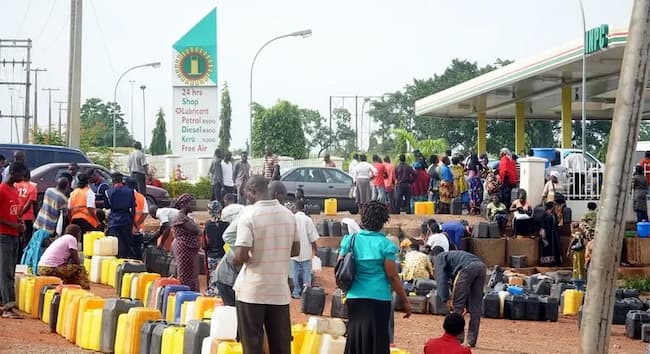The sharp sound of the engine sputtering to life has always signaled a fresh start for Nigerian cab driver Bayo Owolabi. But these days, each start-up feels like a reminder of the growing costs he and millions of Nigerians face. Bayo, who used to fuel his car for less than ₦600 per litre a year ago, now pays over ₦1000 per litre following the government’s removal of the petrol subsidy in mid-2023.
For commuters, small business owners, and every other citizen, this drastic increase has redefined daily routines and strained budgets, forcing Nigerians to adapt in creative ways just to survive.
Across the country, the effects of rising fuel prices have been both immediate and far-reaching. From the swelling price of goods to increased transport fares, the cost of living has climbed suddenly. According to the National Bureau of Statistics (NBS), inflation surged to 25.8% by August 2023, and food prices alone increased by over 30%, the projection that inflation prices will increase did not fail as NBS, in September 2024 reported that inflation rose to 32.70. Against this backdrop, Nigerians are navigating unprecedented hardship, yet they are also devising ways to cope, displaying remarkable resilience and adaptability.
Tracking the Journey of Ordinary Nigerians: Commuters Turn to Carpooling and Remote Work

With transport costs almost doubling, carpooling has gone from being a convenience to a necessity. Paul Itodo, a civil servant based in Lagos, says he used to spend ₦2000 on fuel a day, now spends over ₦5000 with his small Peugeot car with a little distance. In response, Paul and some colleagues have set up a carpool network to cut costs, sharing fuel expenses and taking turns driving.
Nigerians like Musa are not alone. Remote work, initially adopted during the COVID-19 pandemic, has resurfaced as a lifeline for many in urban areas. More employers are offering work-from-home options, helping employees save on transport costs. This adaptation is particularly significant for Lagosians, where traffic congestion adds hours to daily commutes. Nkem Umeh, a data analyst in Lagos, says, “Since the hike, I go to the office twice a week instead of every day. It saves fuel and reduces stress.” For Nkem, this adjustment has led to greater productivity, highlighting how the shift to remote work has been beneficial beyond just cutting expenses.
Small Business Owners Face New Realities
For small business owners, the fuel price hike has led to a different kind of crisis. Chioma Okoro, who runs a small restaurant describes how fuel costs have upended her operations. “Before, I could rely on my generator during power outages, spending around ₦2,000 daily on fuel. Now, it’s closer to ₦5,000. If I pass that cost to customers, I’ll lose them,” she explains.
To cope, Chioma now limits her operating hours to peak times and cooks in bulk to reduce generator usage. Many small businesses, especially those relying heavily on electricity, are exploring alternatives. Solar energy is fast becoming an attractive option, and vendors offer installment plans for solar equipment to help business owners gradually transition from fuel dependence. But for many, like Chioma, solar installations remain a costly investment they can’t yet afford, leaving them balancing high operational costs with limited customer spending power.
Nigerian Resilience: Turning Adversity into Adaptation
Nigerians are famed for their resilience, and as fuel prices continue to bite, people across the country are adopting new strategies to survive:
Carpooling and Shared Rides: From Abuja to Lagos, carpooling has become a popular solution, reducing individual fuel expenses by spreading the cost across multiple passengers. This has led to the creation of informal car-sharing networks, particularly among daily commuters.
Renewable Energy Uptake: Solar energy, while still costly, is seeing increased interest as a sustainable solution to electricity needs. Initiatives offering installment plans for solar equipment have made it accessible for those with steady income streams.
Bulk Buying and Cooperative Systems: Many Nigerians now buy essential items in bulk, with neighbourhood cooperatives allowing households to pool resources. This practice has helped reduce the per-unit cost of items and allows families to stretch their budgets further.
Hybrid Work Models: For those with office jobs, hybrid work schedules allow people to work part-time from home, saving on fuel and transport costs. Even for small businesses, moving closer to target customers and operating online where possible has become a practical measure.
Reinforced Community Support: In many communities, Nigerians have rekindled the spirit of mutual aid, with those who are better off providing food, school fees, and basic necessities to those struggling. The extended family network, a longstanding part of Nigerian culture, has been an invaluable support system amid these challenges.
What Lies Ahead: Future Projections and Solutions
If fuel prices continue on their current path, NBS projections suggest that inflation could peak at over 35% by 2024. This would place further pressure on household spending, particularly on food and essential services, potentially plunging millions more into poverty. Yet, there are potential ways forward.
Government Initiatives and Policy Adjustments
Experts suggest that targeted government policies could alleviate the worst effects of the fuel crisis. Some possible interventions include:
Investing in Public Transportation: Expanding affordable and efficient public transport could ease the burden on commuters. The development of reliable bus and rail systems would provide a cost-effective alternative to private transport, particularly for urban residents.
Promoting Renewable Energy Solutions: Government support for solar installations through subsidies, grants, or low-interest loans could make renewable energy accessible to more households and businesses, reducing dependence on petrol and diesel.
Expanding Social Welfare Programs: Strengthening social welfare initiatives, particularly for low-income families, would help mitigate the immediate impacts of inflation. Programs providing food support, subsidized healthcare, and housing could provide a much-needed safety net for vulnerable populations.
Encouraging Local Production: Nigeria’s heavy reliance on imports exacerbates inflation. Supporting local agriculture and manufacturing could help reduce dependency on imports, create jobs, and stabilize prices in the long term.
Strengthening Cooperative and Community Efforts: Empowering community cooperatives and collective resource systems can provide additional buffers for low-income households, allowing them to save through group savings and loans programs.
A Decade in Review: 2024 vs. 2034
By 2034, Nigeria’s economic landscape will likely look drastically different. If current trends are reversed and sustainable practices take root, inflation could stabilise, and alternative energy sources may have become mainstream, reducing reliance on petrol altogether. However, if fuel dependence remains high and inflation unchecked, projections suggest even more severe economic challenges for future generations.
A Way Forward for Nigeria’s Masses
While the effects of the fuel hike are severe, Nigerians are forging ahead. The stories of individuals like Bayo, paul, and Chioma showcase the adaptability and innovation of ordinary citizens. As they press on through adversity, they reflect the enduring strength and resilience that define Nigeria’s spirit.
To truly support this resilience, collaborative solutions are essential; government, businesses, and communities alike have a role to play. Nigerians have shown that they can adapt and innovate. Now, they hope that the systems supporting them will do the same.












